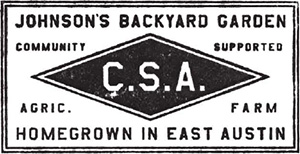
JBG'S YOLK FOLKS
04/30/21 — Ada Broussard
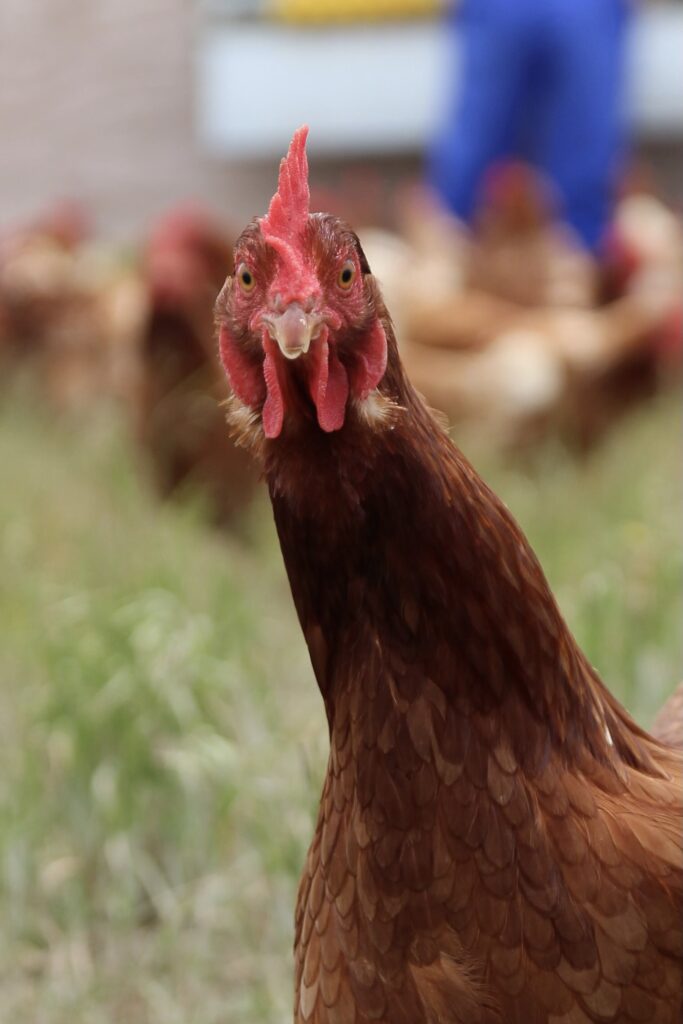 A curious, and most certainly happy, hen at Humble Rooster. Wonderful photo by Nathan at Humble Rooster.
A curious, and most certainly happy, hen at Humble Rooster. Wonderful photo by Nathan at Humble Rooster.
Since the early days of JBG when Brenton had his own backyard flock, we’ve loved offering (Austin) CSA Members the ability to add eggs onto their weekly share, because, with eggs + veggies, you can travel to a lot of places. (For those members outside of Austin, we're unable to offer eggs because our drivers don't have room in their vans! In case you're wondering why :) The eggs we offer aren’t just any eggs, and we’ve taken special care to partner up with local farmers who produce high-quality eggs laid by happy hens on pasture. Precious guardian dogs, while not a requirement of our egg standards, also just so happen to be a common thread.
The labels on egg cartons are almost endless and distinguishing a good egg from a bad egg can be confusing. Before we highlight the amazing producers JBG partners with, let us take a moment to tease apart some of the labels you might see at the grocery store.
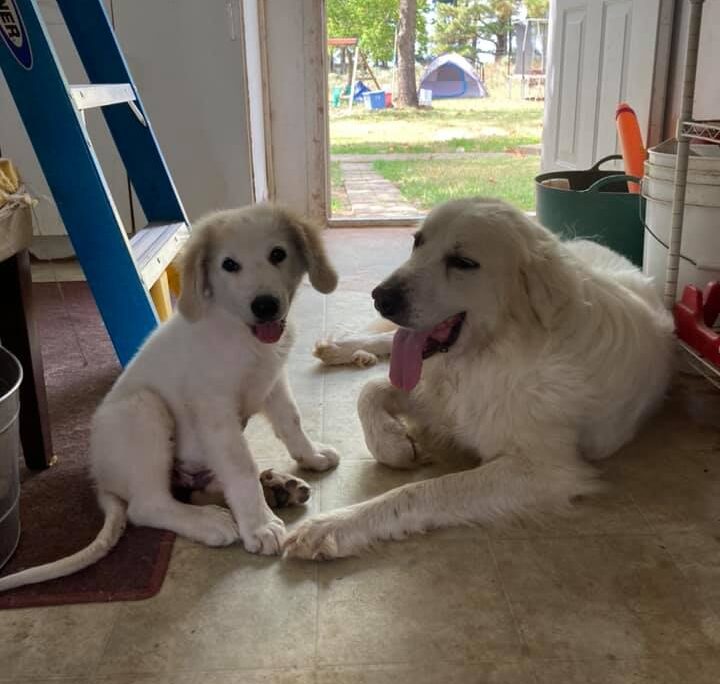 Just one example of said floofers. These are some of the guardian dogs at Happy Chicks.
Just one example of said floofers. These are some of the guardian dogs at Happy Chicks.
Pasture-Raised sometimes called “Pastured” (not to be confused with pasteurized): Pasture-raised or pastured eggs means that the chickens are raised on pasture, with access to open meadows or woody forests. These chickens hunt for food, peck around, and have space to express their truest chickenliness. They can dust-bathe, perch, and spread their wings - all-natural behaviors of these little dinosaurs. Pasture-raised chickens have access to a coop/nesting safe from predators, where they dutifully march at night to catch some Zzz or lay an egg. As in the case with all of the farms we work with, these coops can be mobile! We call these chicken tractors. The coops (and their inhabitants) are moved throughout an area so that the chickens can have access to fresh grass, and so that their impact (the nutrient-dense poop… the scratching…) can be dispersed throughout a landscape. Chickens raised in this manner benefit from a diverse diet and open air. Eggs laid by these gals feature a deep yellow (sometimes orange!) yolk, with clear and bouncy whites. All of the eggs we offer fit this bucolic bill.
It’s noteworthy that “pasture-raised” or “pastured” doesn’t have a legal certification process behind it. Some eggs you see in a store labeled with “pasture-raised” may be produced by chickens who merely have access to a small, outdoor run. While these chickens may have a better life than those raised in a factory farm, they’re still not running on an actual pasture.
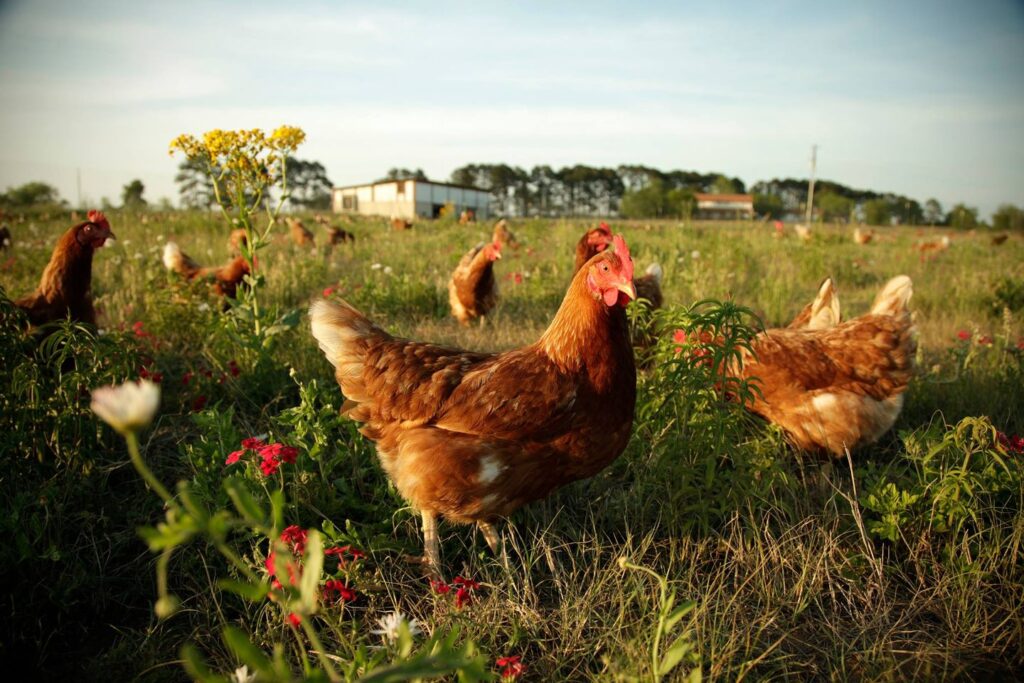 In the springtime, pasture-raised chickens get to romp and scratch in pastures of verbena and goldenrod. These are the lucky gals at Happy Chicks.
In the springtime, pasture-raised chickens get to romp and scratch in pastures of verbena and goldenrod. These are the lucky gals at Happy Chicks.
Organic: Even chickens raised in a thriving pastured ecosystem need supplemental food. If eggs are labeled “organic” it means that the chickens are eating feed that is certified organic and that they are not receiving any hormones or antibiotics. Not all pastured chickens are organic. All certified organic chickens must have access to the outdoors, though the quality of this access varies.
Free-Range: According to the USDA, free-range chickens must have “continuous access to an outdoor area during their laying cycle". The quality and size of this outdoor space can vary drastically, and it could simply mean a very small fenced-in area meant to suit thousand of birds.
Cage-free: This USDA designation simply means that chickens are not confined to individual cages (which are usually 8.5 x 11 inches, or the size of a sheet of computer paper. This certification does not stipulate, however, that the chickens must be allowed outdoors.
Most producers want you to know if they’re taking good care of their animals, and so an egg carton with no label likely means that chickens were raised in pretty horrendous, very-caged, conditions. The vast majority of eggs produced in the United States fall under this unfortunate umbrella. We’ll spare you the photos, but if you’re curious, google is littered with some visuals.
There are even more labels that get slapped on cartons like natural, farm-fresh, “Certified Humane”, “Animal Welfare Approved”, “Vegetarian-Fed” and also graded vs. ungraded. We don’t want to take up space here to discuss any more labels, however. As in the case with most foods, if you’re interested in consuming products that you can guarantee are good for you, and good for the environment, it’s simplest just to know your producer… and even pay a visit to their farm. And even though you might not personally know the farmers at Ringger Family, Humble Rooster, and Happy Chicks farms, we do! You can take a sigh of relief- they are all incredible farmers, raising chickens in the most dignified way. Yes, they are all raising their flocks on pasture, but the stewardship of their animals goes beyond this simplistic label. These chickens have great lives! (And produce superb eggs!) We’ve been partnering with some of these farms for nearly 10 years, and we see these friendly faces each week when they make deliveries to the Packing Shed. We hope you’ll take our word for it that these farmers are worth supporting, not only because they produce a high-quality product produced by sustainable means, but also because they’re good people, with good families, doing eggcellent work. Sorry, we couldn’t help ourselves.
RINGGER FAMILY FARMS Ringger Family Farms is owned by Eli Ringger. Eli is the son of Dale and Amy Ringger, owners of Fruitful Hill Farm, an amazing 50-acre chemical-free vegetable farm located in Bastrop County. The Ringgers have been raising happy chickens for as long as we’ve known them (we’ve been buying their eggs since 2012!), and a few years ago, their oldest son Eli took over the egg portion of the business, now called Ringger Family Farms.
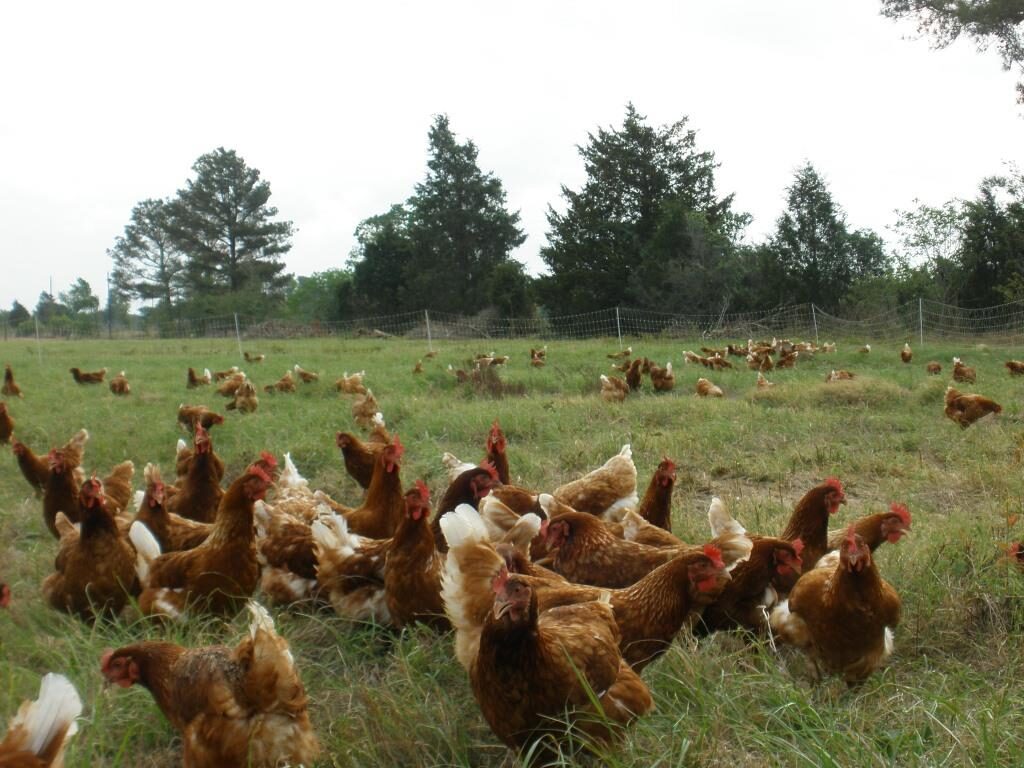 Here are the healthy hens at Ringer Family farms. In the background, you can see the chicken fencing which gets moved through the pasture along with the flock, and mobile coops. Thanks Fruitful Hill for the photo!
Here are the healthy hens at Ringer Family farms. In the background, you can see the chicken fencing which gets moved through the pasture along with the flock, and mobile coops. Thanks Fruitful Hill for the photo!
At the Ringger’s farm, their “Hy-Line Brown” (the breed of chicken they raise) are rotated on chemical-free pasture and are fed a non-GMO, soy-free feed that the Ringgers grind themselves. These hens are living the good life, and even get veggie scraps from time to time.
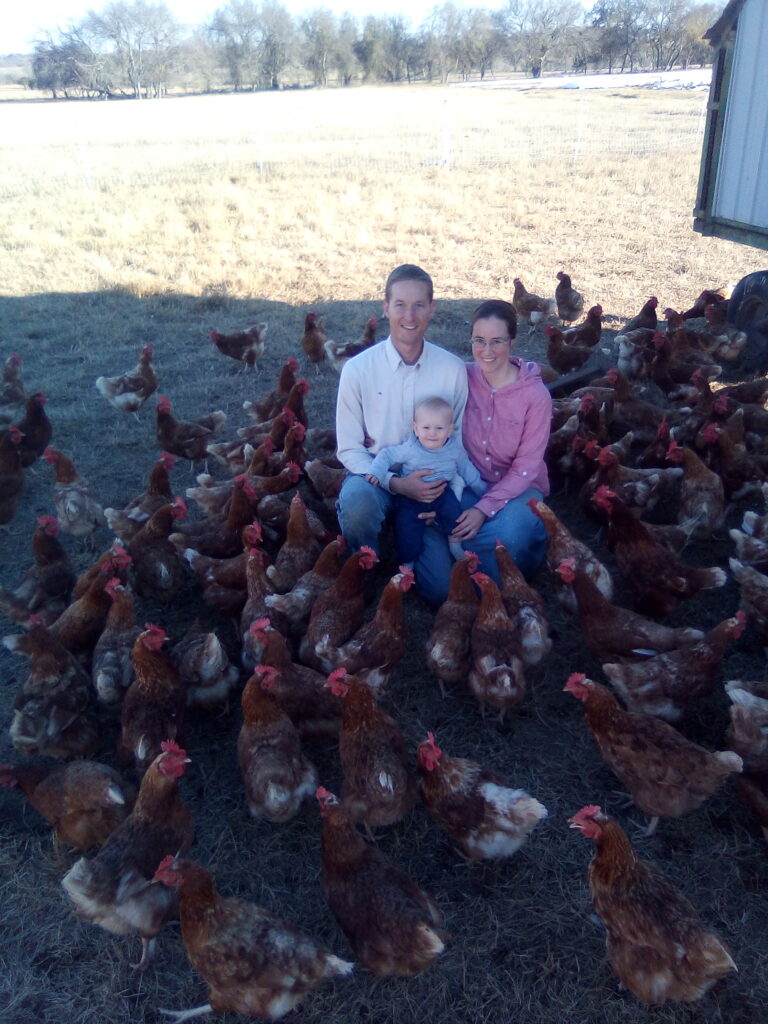 Eli, his wife Sheila, and their son John... and of course, all the ladies!
Eli, his wife Sheila, and their son John... and of course, all the ladies!
If you’d like to see these hens for yourself, the Ringgers have a farmstand every Friday afternoon from 2-5:30 PM. The address is 2421 SH 304, Smithville TX 78957. Look for the red barn and tents. If you want to see the chickens, just let them know.. they’re never far! In addition to pastured eggs, Ringger Family Farm also sells pastured beef, pastured goat meat, and pork from pigs living in the woods, fed veggie scraps, and non-GMO, soy-free feed.
HUMBLE ROOSTER FARM Humble Rooster Farm is owned by the Hicks family and is located 40 minutes northwest of Austin in Bertram, Texas. They raise poultry outside on pasture in the sunshine, using sustainable farming methods. Their birds are pasture-raised, soy-free, corn-free, hormone-free, antibiotic-free, chemical-free, non-GMO, and are supplemented with H and H Feed, a freshly milled Texas feed.
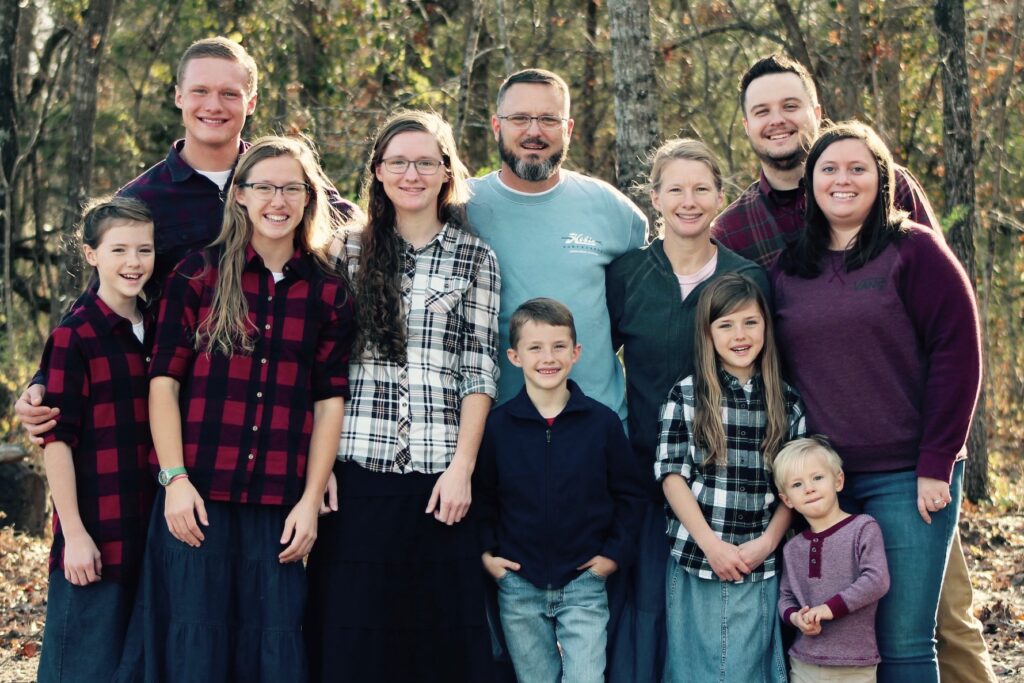 The Hicks!
The Hicks!
We’ve been working with Humble rooster since 2018, and have been impressed with the egg quality since day one. Like the other two vendors we work with, Humble Rooster’s eggs are truly pasture-raised. Taken from their website: “What "pastured" means for us is a rotational grazing process. Our chickens don't simply have ability to pasture. Our chickens live on the pasture. We routinely rotate our poultry on pasture. Each week, our hens' mobile coops are moved to new areas…. This process is one aspect of how we are able to be antibiotic- and chemical-free, because our birds are constantly moving to "cleaner" ground, helping maintain health naturally.” If you’d like to visit Humble Rooster, they do have an option for a farm pickup on Tuesdays and Thursdays from 3 pm and 5 pm. More info on their website.
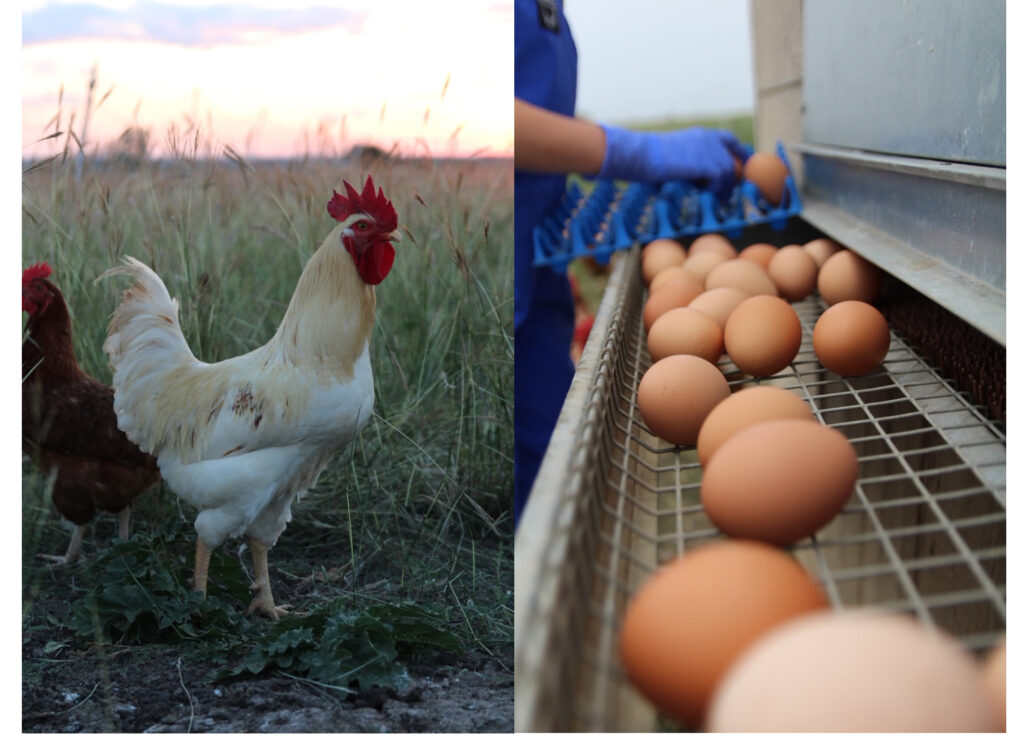 Many chicken producers will have a rooster or two along with their flock of hens. His job is to help protect the ladies. In the photo on the right, you can see egg collection happening at Humble Rooster. Nesting boxes are located on the inside of the coop, but this collection tray is conveniently located on the outside. Photos provided by Nathan at Humble Rooster.
Many chicken producers will have a rooster or two along with their flock of hens. His job is to help protect the ladies. In the photo on the right, you can see egg collection happening at Humble Rooster. Nesting boxes are located on the inside of the coop, but this collection tray is conveniently located on the outside. Photos provided by Nathan at Humble Rooster.
HAPPY CHICK FARM
As the name suggests, the hens at Happy Chick are… happy. This farm, located in Lockhart, is owned and operated by Kenny and Stephanie Johnson. Like the other two producers we work with, the hens at Happy Chick are raised on beautiful pasture.
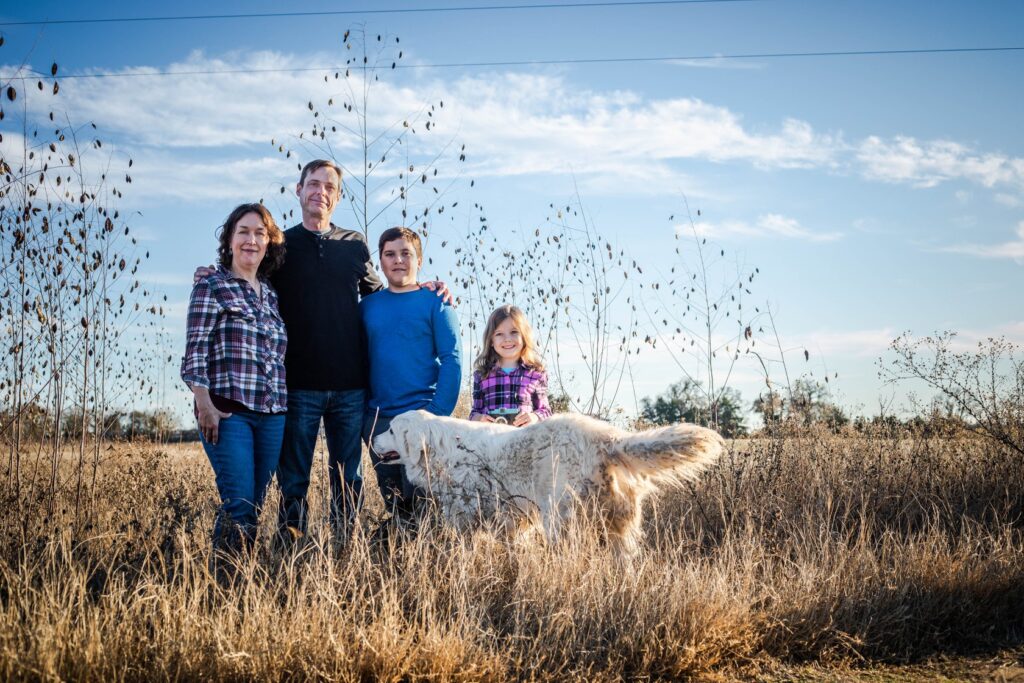 The Johnson Family behind Happy Chick!
The Johnson Family behind Happy Chick!
In a recent article Kenny wrote for his local newspaper, he shared some wise words on egg producers like him (and vegetable producers, like us): “I realize locally produced, farm-fresh foods are typically more expensive, but buying cheaply produced food in the short term has costs in the long term. Most of us know this, but still value the dollar over sustainability. Who wouldn’t want to save a buck? Factory-style industrial farms feed over 80% of the population, creating economies of scale untouchable by the small-scale family farmer. It’s not that sourcing local is expensive. It’s that factory-style foods are cheap, of poor quality, mass-produced, and are distributed across the entire country by only a handful of distribution companies whose supply lines crumble at the sight of a winter storm.”
Check out Happy Chick Facebook Page to see more cute guardian dog pictures, and to inquire about farm visits.
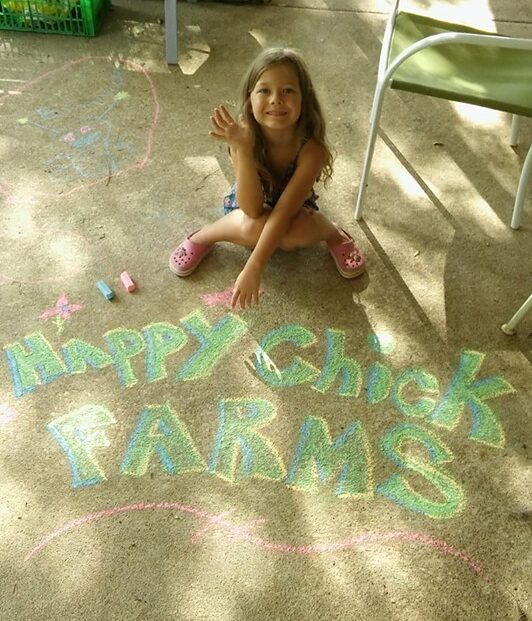 Emma, the youngest farmer at Happy Chicks.
Emma, the youngest farmer at Happy Chicks.
If you’re a CSA Member and would like to give some of these locally-produced eggs a try, log in to your account. You can add one dozen (or many) through the “My Deliveries” tab. Having trouble? Just shoot A an email and she can help you out - farm@jbgorganic.com.
Thanks for reading. We hope you have an eggstraordinary day!
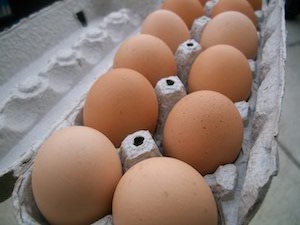 The incredible, edible, egg. Photo and eggs by Humble Rooster.
The incredible, edible, egg. Photo and eggs by Humble Rooster.





 0 ITEMS IN CART
0 ITEMS IN CART 
